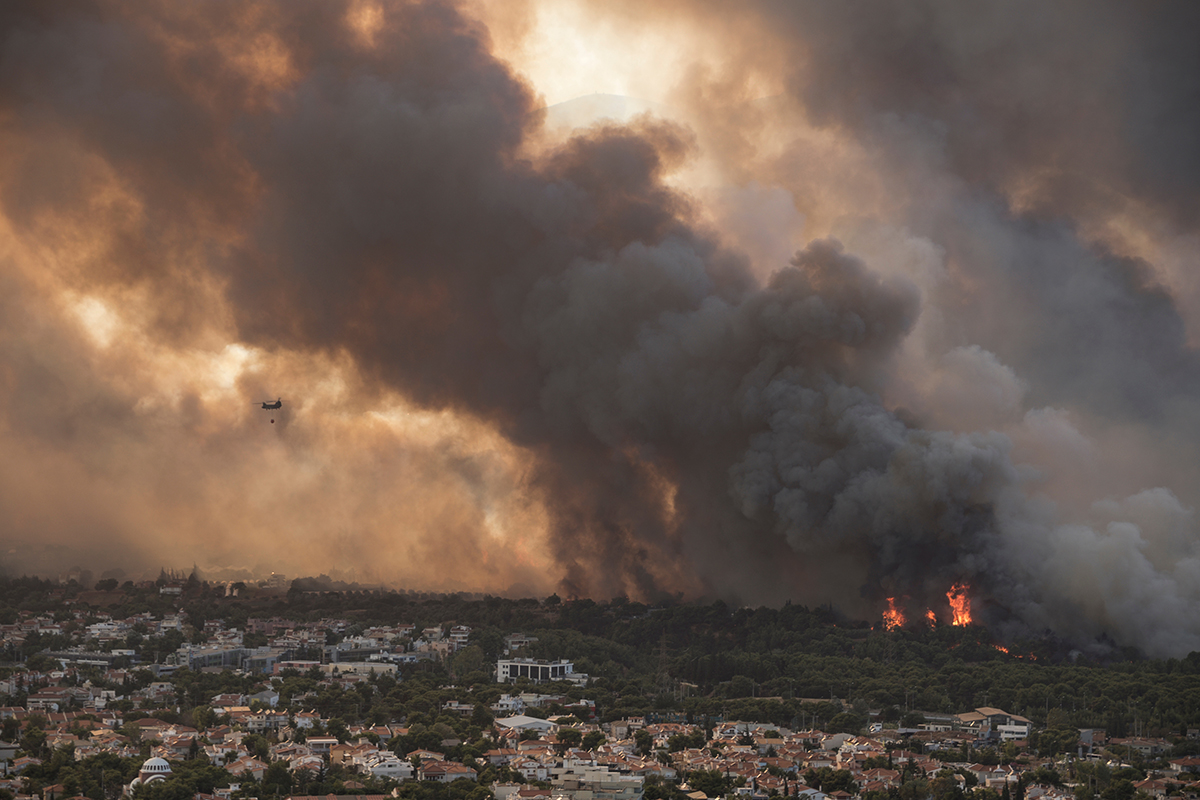In Agia Paraskevi, situated near Mount Panitha and a mere 15 miles away from Athens, a haunting scene unfolded: a distraught woman, tears rolling down her cheeks, looked upon her charred home. The framework of her residence stood like a desperate plea against the gray skies. Yet again, wildfires have taken hold of Greece, and this time with a vengeance unprecedented in its fury.
Earlier that day, in the same village, we spoke to Nikos. He was diligently spraying water around his home, trying to stave off the looming threat of fire. For two days, this had been his routine. He had readied a bag and was prepared to evacuate with his family. But, he asserted, he would only leave when absolutely compelled. His home was a testament to years of hard work and cherished memories.
However, soon the decision was made for him. Authorities arrived, evacuating the village. A tearful Nikos complied, leaving behind a moist patch of soil as the sole guardian of his home.
This expansive national park, often termed “the lungs of Athens”, is a sanctuary. It not only offers respite from Athens’ sweltering summers but also acts as a natural air purifier. Its vast forested expanses neutralize pollution and mitigate the city’s soaring temperatures.
Yet, now this haven is a battleground. Over 200 wildfires have erupted across Greece in just a matter of days. The daytime is marked by plumes of smoke, the wailing of sirens, and the rhythmic beating of helicopter blades, as efforts to combat the flames intensify.
These helicopters, vital to the firefighting efforts, are limited to daylight operations. With nightfall, they retreat, leaving the persistent fires to blaze on. A major adversary is the unpredictable wind, capable of amplifying even the smallest ember. As Kostas, a firefighter, expressed, “The wind is our nemesis; we can’t be complacent.” We experienced this firsthand, narrowly escaping a rapidly escalating fire.
With each dawn, the extent of devastation becomes more evident: green forests are replaced by scorched earth and remnants of burnt trees. The situation is equally grim across Greece, and resources are spread thin. In a tragic revelation, 18 individuals were discovered dead near the Dadia Forest. These fires, some of the worst in European history, have left indelible marks.
The repercussions go beyond immediate destruction. The air quality deteriorates, making breathing a laborious task. Dr. Michalis Diakakis highlighted the long-term implications: increased flood and landslide risks, compromised air quality, and accentuated climate change effects. He emphasized the increasing regularity of such extreme heat.
The factors igniting these fires range from natural causes like lightning to human interventions. Climate change, exacerbated by human actions, is a significant contributor, making conditions more conducive for fires.
With Parnitha still under threat, ash and carbon emissions are rampant. Shockingly, arson appears to play a role in some of these fires, leading to 79 arrests. The disbelief among the Greeks is palpable. Dr. Diakakis pondered on the intent of these arsonists, asking, “What drives them?”
After the evacuation of Agia Paraskevi, upon our return, we discovered a rare sight amidst the devastation: Nikos’ house had survived. Its humble protective moat of water had held the flames at bay. But as heartening as this small victory was, it underscores the monumental challenge Greece faces, both now and in the future.
Greece’s current plight is emblematic of a world grappling with the multifaceted challenges of climate change. From the resilience of individuals like Nikos to the collective spirit of emergency responders, the nation reminds us that unity and determination are as crucial as ever. But for a sustainable future, this dire situation also underlines the pressing need for global action, proactive strategies, and an unwavering commitment to safeguarding our planet’s fragile ecosystems.







